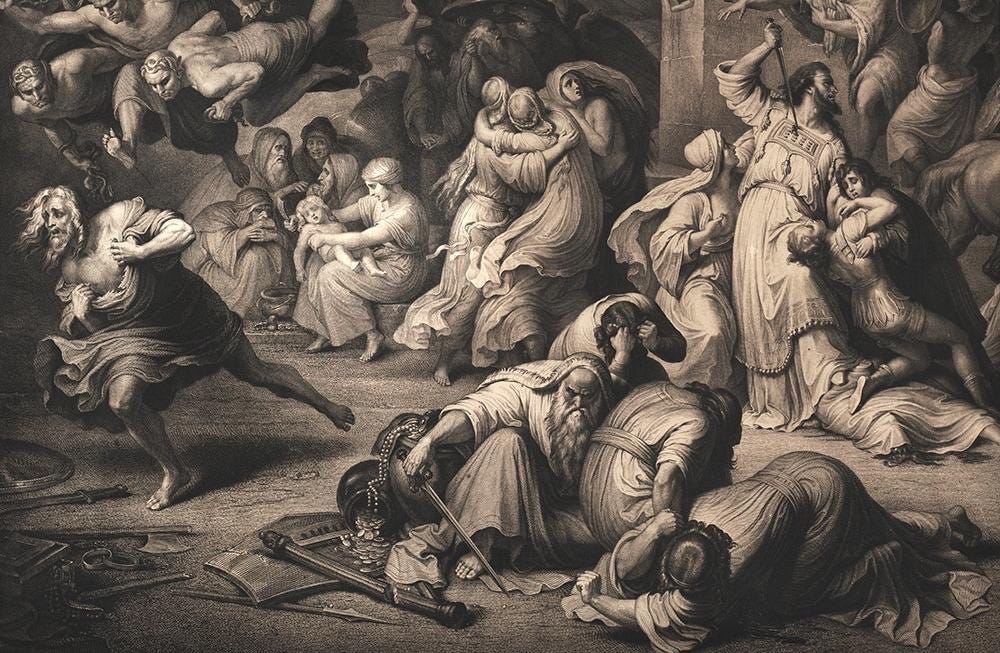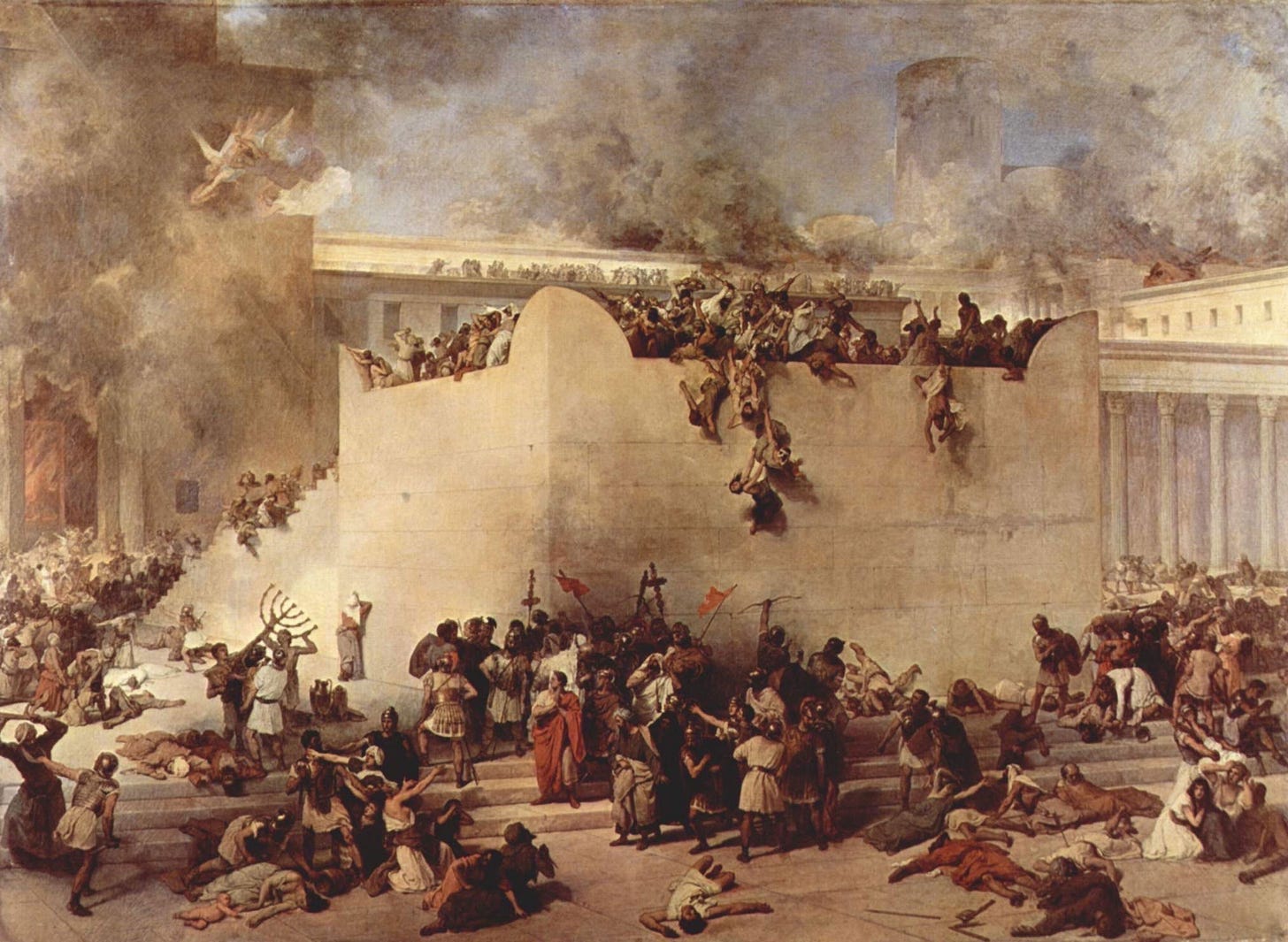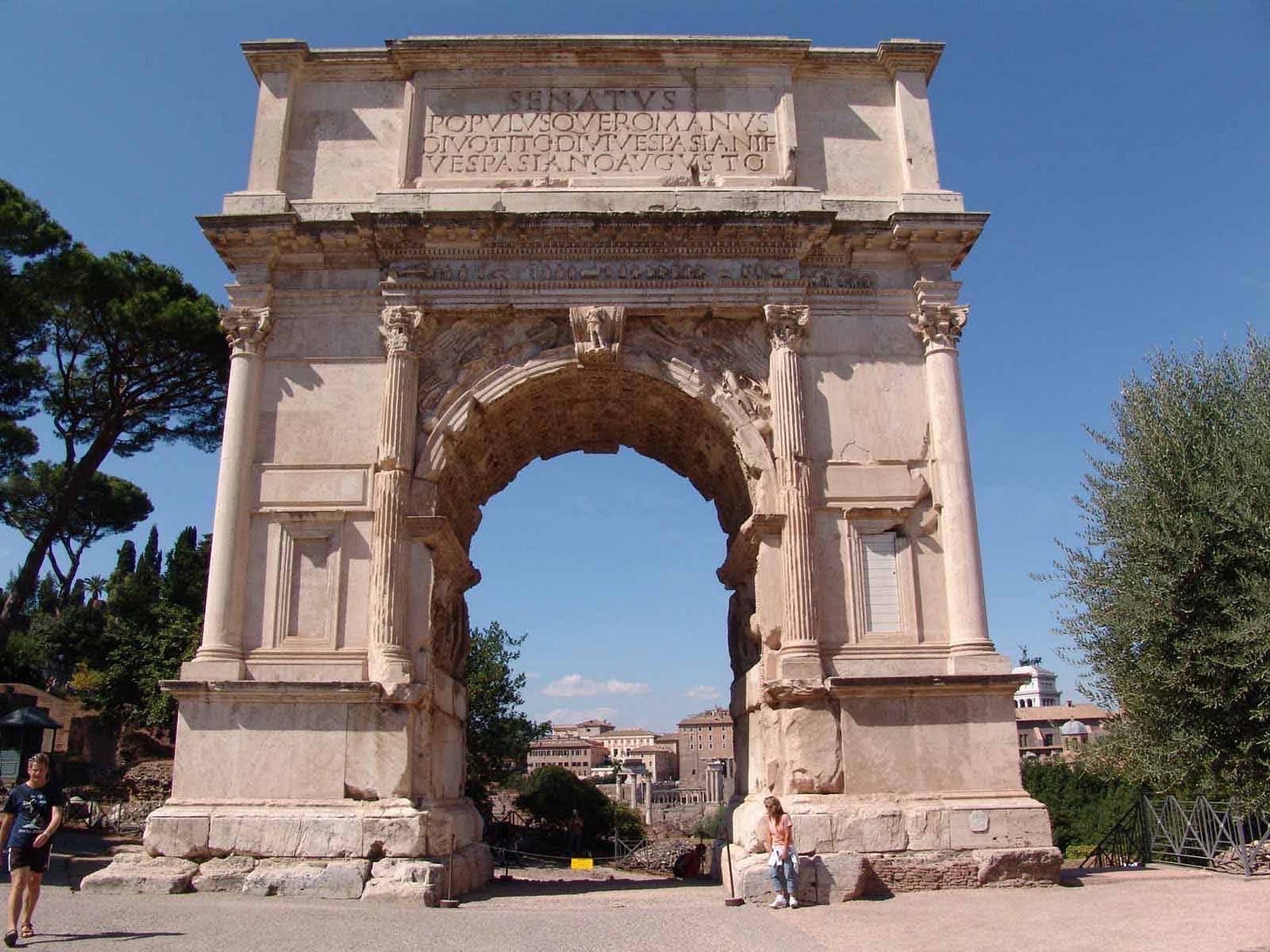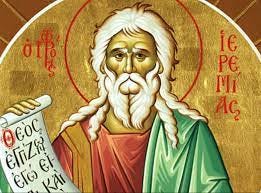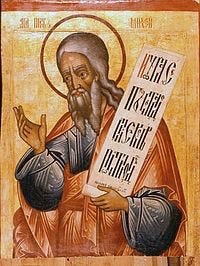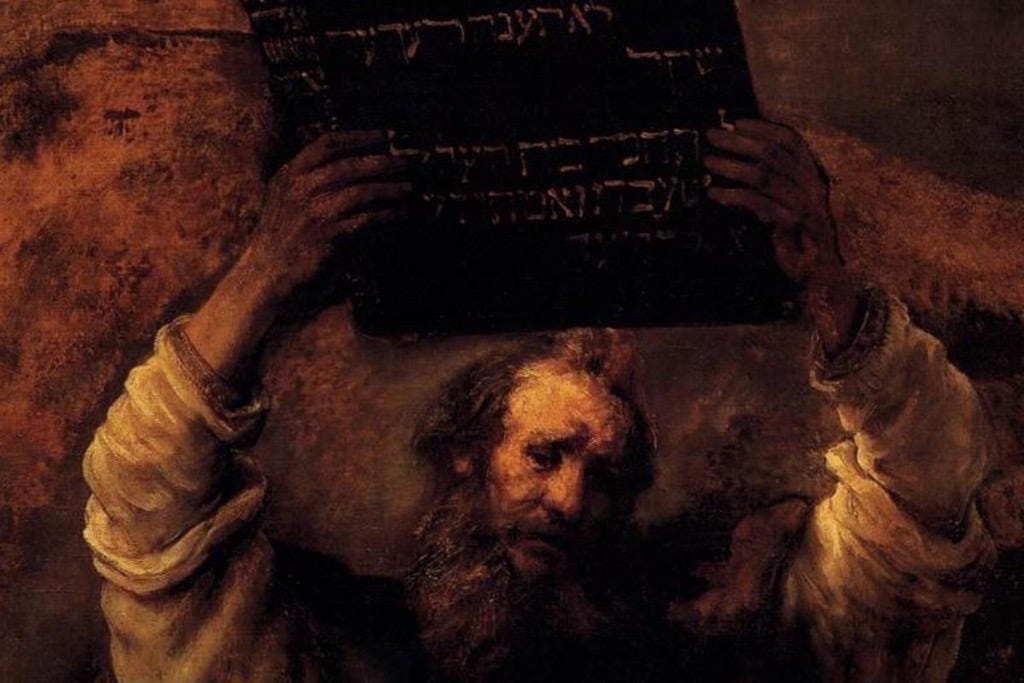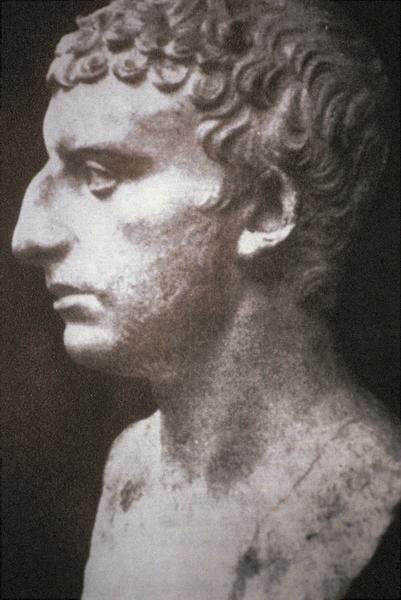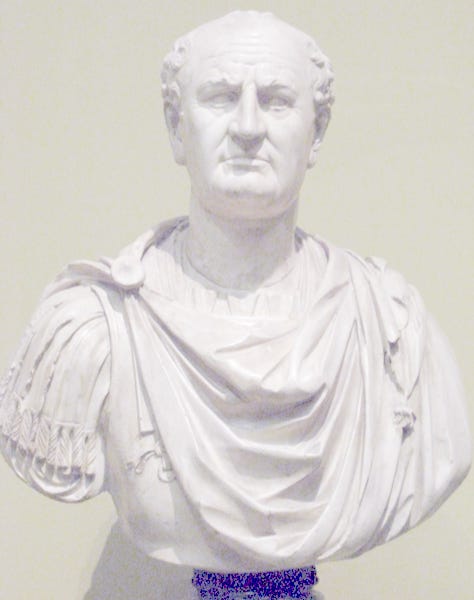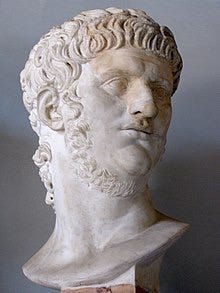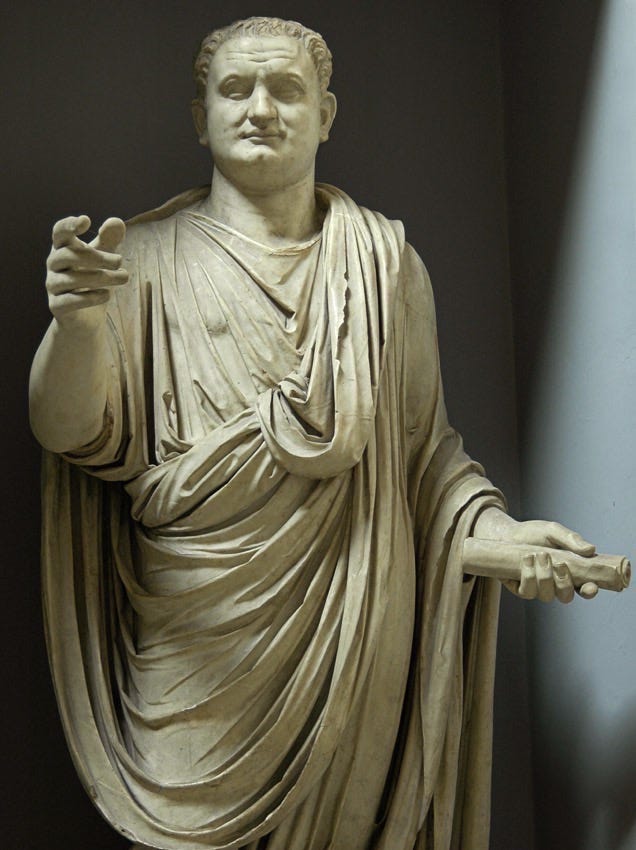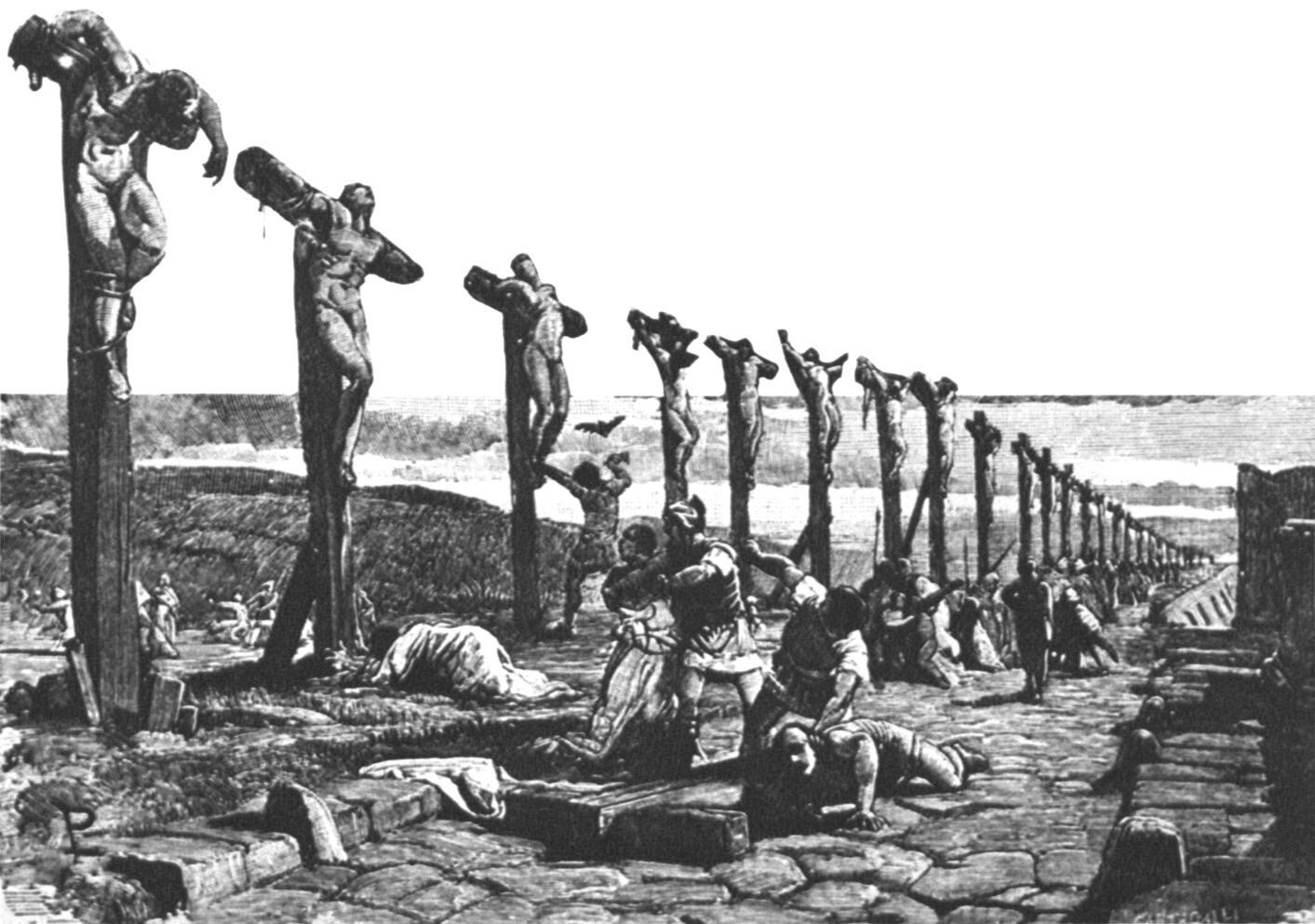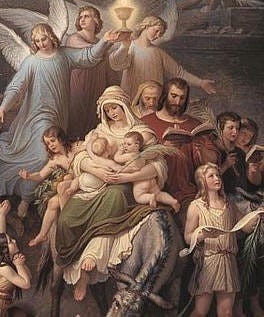The Siege of Jerusalem
A horrifying history of Christ's prophecy and the judgment of desolation on Jerusalem.
The Siege of Jerusalem in the year 70 CE was the decisive event of the First Jewish–Roman War. The Roman army, led by future Emperor Titus, besieged and conquered the city of Jerusalem, which had been controlled by Judean rebel factions since the Jerusalem riots of 66 CE.
Christ had warned some 40 years prior:
“When you see Jerusalem being surrounded by armies, you will know that its desolation is near. Then let those who are in Judea flee to the mountains, let those in the city get out, and let those in the country not enter the city. For this is the time of punishment in fulfillment of all that has been written. How dreadful it will be in those days for pregnant women and nursing mothers! There will be great distress in the land and wrath against this people. They will fall by the sword and will be taken as prisoners to all the nations. Jerusalem will be trampled on by the Gentiles until the times of the Gentiles are fulfilled.”
Even before its fall, Jerusalem was wracked by bloody factional infighting and famine. When the legions finally approached the city in 70 A.D., one Zealot faction even burned the city’s largest grain reserve to force the population to fight to the death against the Romans, or die of starvation. It was an act of utter madness, though not atypical, that would cost the defenders dearly. The siege lasted six months, during which time a terrible famine was inflicted upon the city. Josephus describes this and other horrors most graphically, including an account of a woman so taken with hunger that she killed, cooked, and ate her own son (Wars of the Jews 5.10-6.5)
The Roman siege of Jerusalem ended on the 9th of Av (August 30th, 70 CE) with the burning and destruction of the Second Temple, and the Romans entered and sacked the Lower City. The 1st century Jewish-Roman historian Josephus records that more than 1,100,000 Jews perished, and nearly 100,000 were taken captive. 70,000 Jewish slaves built the Roman Coliseum.
C.H. Spurgeon (1834-1892), wrote:
Read the record written by Josephus of the destruction of Jerusalem, and see how truly our Lord’s words were fulfilled. The Jews impiously said, concerning the death of Christ, "His blood be on us, and on our children." Never did any other people invoke such an awful curse upon themselves, and upon no other nation did such a judgment ever fall. We read of Jews crucified till there was no more wood for making crosses; of thousands of the people slaying one another in their fierce faction fights within the city; of so many of them being sold for slaves that they became a drug in the market, and all but valueless; and of the fearful carnage when the Romans at length entered the doomed capital; and the blood-curdling story exactly bears out the Savior’s statement uttered nearly forty years before the terrible events occurred.'
'The destruction of Jerusalem was more terrible than anything that the world has ever witnessed, either before or since. Even Titus seemed to see in his cruel work the hand of an avenging God.' (Commentary on Matthew, p. 412-413).
The Arch of Titus, celebrating the Roman sack of Jerusalem and the Temple, still stands in Rome:
The destruction of both the first and second temples is still mourned annually as the Jewish fast Tisha B'Av. Whether coincidentally or by divine providence, the 9th of Av is the date for the Babylonian siege and destruction of the first temple in 587 BC, and is also the exact same date for the Roman siege and destruction of the second temple several hundred years later, in 70 CE. In both events, large numbers of Jews were killed or taken captive.
Siege in Old Testament Prophecy
Not only did Jesus prophesy the destruction of Jerusalem, but he also viewed it as the fulfillment of Old Testament prophecies, for he said, “this is the time of punishment in fulfillment of all that has been written.“
Accordingly, Old Testament prophecies contain dire warnings about siege, and the destruction of Jerusalem, as a divine punishment for violating the Sinaitic Covenant and for rejecting the Messiah.
The prophet Jeremiah wrote:
“I will make Jerusalem a heap of ruins, a haunt of jackals; and I will make the cities of Judah a desolation, without inhabitant…
“I will also make this city a desolation and an object of hissing; everyone who passes by it will be astonished and hiss because of all its disasters.”
Micah prophesied:
“Hear this, you leaders of Jacob, you rulers of Israel, who despise justice and distort all that is right; who build Zion with bloodshed, and Jerusalem with wickedness. Her leaders judge for a bribe, her priests teach for a price, and her prophets tell fortunes for money. Yet they look for the Lord’s support and say, ‘Is not the Lord among us? No disaster will come upon us.’ Therefore because of you, Zion will be plowed like a field, Jerusalem will become a heap of rubble, the temple hill a mound overgrown with thickets.”
Ezekiel prophesied:
“Therefore this is what the Sovereign Lord says: I myself am against you, Jerusalem, and I will inflict punishment on you in the sight of the nations. Because of all your detestable idols, I will do to you what I have never done before and will never do again. Therefore in your midst parents will eat their children, and children will eat their parents. I will inflict punishment on you and will scatter all your survivors to the winds. Therefore as surely as I live, declares the Sovereign Lord, because you have defiled my sanctuary with all your vile images and detestable practices…I will not look on you with pity or spare you. A third of your people will die of the plague or perish by famine inside you; a third will fall by the sword outside your walls; and a third I will scatter to the winds and pursue with drawn sword…I will make you a ruin and a reproach among the nations around you, in the sight of all who pass by. You will be a reproach and a taunt, a warning and an object of horror to the nations around you when I inflict punishment on you in anger and in wrath and with stinging rebuke. I, the Lord, have spoken. When I shoot at you with my deadly and destructive arrows of famine, I will shoot to destroy you. I will bring more and more famine upon you and cut off your supply of food…Plague and bloodshed will sweep through you, and I will bring the sword against you. I the Lord have spoken.”
Siege in the Sinaitic Covenant
Even at the very beginning, Moses warned the Hebrews at Sinai the consequences of breaking their covenant with God:
“If you do not obey the Lord your God and do not carefully follow all his commands and decrees I am giving you today…the Lord will cause you to be defeated before your enemies…and you will become a thing of horror to all the kingdoms on earth. Your carcasses will be food for all the birds and the wild animals, and there will be no one to frighten them away...I will lay your cities waste and make your sanctuaries desolate…I myself will make the land desolate and your enemies who live in it will be appalled…You will become a thing of horror, a byword and an object of ridicule among all the peoples where the Lord will drive you…All these curses will come on you…they will be a sign and a wonder to you and your descendants forever…
“The Lord will bring a nation against you from far away…without respect for the old or pity for the young. They will lay siege to all the cities throughout your land until the high fortified walls – in which you trust – fall down. They will besiege all the cities throughout the land the Lord your God is giving you. Because of the suffering your enemy will inflict on you during the siege, you will eat the fruit of the womb, the flesh of the sons and daughters the Lord your God has given you…because of the suffering your enemy will inflict on you during the siege of your cities…
“You will be uprooted from the land you are entering to possess. Then the Lord will scatter you among all nations, from one end of the earth to the other…Your children who follow you in later generations and foreigners who come from distant lands will see the calamities that have fallen on the land and the diseases with which the LORD has afflicted it. The whole land will be a burning waste of salt and sulfur--nothing planted, nothing sprouting, no vegetation growing on it. It will be like the destruction of Sodom and Gomorrah, Admah and Zeboyim, which the LORD overthrew in fierce anger. All the nations will ask: ‘Why has the LORD done this to this land? Why this fierce, burning anger?’
“And the answer will be: ‘It is because this people abandoned the covenant of the LORD, the God of their ancestors, the covenant he made with them when he brought them out of Egypt…Therefore the LORD's anger burned against this land, so that he brought on it all the curses written in this book. In furious anger and in great wrath the LORD uprooted them from their land and thrust them into another land, as it is now.”
In Deuteronomy, Moses also explicitly warned the Israelites that a prophet like him would come who would speak God’s words, and that anyone who failed to listen to him would be called to account by God:
“The Lord your God will raise up for you a Prophet like me from your midst, from your brethren. Him you shall hear…and I will put My words in His mouth, and He shall speak to them all that I command Him. And it shall be that whoever will not hear My words, which He speaks in My name, I will require it of him.”
Jesus was this prophet. In the Gospel of John, he says:
“For I did not speak on My own initiative, but the Father Himself who sent Me has given Me a commandment as to what to say and what to speak. I know that His commandment is eternal life; therefore the things I speak, I speak just as the Father has told Me.”
In the book of Acts, Peter interprets Moses’ warning in Deuteronomy as one of utter destruction for those who refuse to hear Jesus’ words:
“For Moses truly said to the fathers, ‘The Lord your God will raise up for you a Prophet like me from your brethren. Him you shall hear in all things, whatever He says to you. And it shall be that every soul who will not hear that Prophet shall be utterly destroyed from among the people.’”
Christ Warns of the Coming Siege and Destruction of the Temple
And Jesus went out and departed from the temple. And His disciples came to Him to show Him the buildings of the temple. And Jesus said to them, “Do you not see all these things? Truly I say to you, There shall not be left here one stone on another that shall not be thrown down.”
Much is made of the Jewish “blood libel” from a notorious verse in Matthew:
Then all the people answered and said, “Let His blood be on us and on our children.”
Yet Jesus had already specified that his own generation–and their children–were the precise victims who would personally suffer God’s wrath in the coming siege of Jerusalem, an event of which he warned repeatedly, even when he was suffering his own execution and death!
As Jesus carried the cross to Golgotha, he charged the women who “bewailed and lamented him” saying:
“Daughters of Jerusalem, weep not for me, but weep for yourselves, and for your children, for in the coming days you shall say, Blessed are the barren, and the wombs that never bare, and the paps which never gave suck. Then shall they begin to say to the mountains, Fall on us; and to the hills, cover us…”
Christ’s warning pinpointed the exact generations who were eventually destroyed, 40 years later.
And when [Jesus] was come near, he beheld the city, and wept over it, saying, "If you had known, even you, at least in this your day, the things which belong unto your peace! but now they are hid from your eyes. For the days shall come upon you, that your enemies shall cast a trench about you, and compass you around, and hem you in on every side, and shall level you to the ground, you and your children within you; and they shall not leave in you one stone upon another; because you did not recognize the time of your visitation.”
A Trench and a Wall
According to 1st century historian Josephus, when the legions of Rome finally got to Jerusalem they camped at the Mount of Olives (The Wars Of The Jews, 5:2:3). In fulfillment of Christ’s words, the Romans indeed dug a trench around Jerusalem, and constructed a nine mile-long siege wall in three days that totally enclosed the city (The Wars Of The Jews, 5:12:2).
Daniel’s Prophecy of the 70 Weeks
One of the most astonishing prophecies about the destruction of Jerusalem by the Romans is that it happened just as Daniel had written centuries earlier during the Babylonian captivity: that the Second Temple would be destroyed only after the Messiah had come and been executed, and not before he had first presented himself to Israel:
“Seventy sevens are determined upon your people and your holy city,
[“Sevens” or “weeks” meaning “weeks of seven years”]
To finish transgression,
To put an end to sin,
To atone for wickedness,
To bring in everlasting righteousness,
To seal up vision and prophecy,
And to anoint the Most Holy.
Know therefore and understand,
That from the time the command goes out
To restore and rebuild Jerusalem
Until Messiah the Prince, comes,
Shall be seven weeks and sixty-two weeks;
It will be rebuilt with streets and a trench,
but in times of trouble.
And after the sixty-two weeks
Messiah shall be put to death, but not for Himself;
And the people of the ruler who is to come
Shall destroy the city and the temple.
The end will come like a flood:
War will continue until the end,
and desolations have been decreed.”
Daniel 9:24-26
Interestingly, when Daniel wrote this, he predicted that the Second Temple would be destroyed, even though it had not yet even been rebuilt. (By Herod the Great, who had not yet been born). Daniel’s prophecy also specifies the exact time interval between the command to rebuild and the appearance of the Messiah, as well as the fact that the Messiah would be executed, and that there would be a coming destruction of Jerusalem and the temple some time after that execution takes place, accompanied and followed by desolations.
“Truly I tell you, all this will come on this generation”
Jesus made clear there would be no further delay for the coming desolation in Judea. It would be his own generation – and their children – who would directly suffer God’s wrath:
“That the blood of all the prophets, which was shed from the foundation of the world, may be required of this generation; From the blood of Abel unto the blood of Zacharias, who perished between the altar and the temple: truly I say to you, the blood shall be required of this generation.” – Luke 11:50-51
But when he saw many of the Pharisees and Sadducees come to his baptism, he said to them, “O brood of vipers, who has warned you to flee from the wrath to come?” – Matthew 3:7
"Do not think that I have come to bring peace to the earth. I have not come to bring peace, but a sword.” – Matthew 10:34
“For these are days of vengeance, to fulfill all that is written.” – Luke 21:22
Then some of the Pharisees and teachers of the law said to him, “Teacher, we want to see a sign from you.”
He answered, “A wicked and adulterous generation asks for a sign! But none will be given it except the sign of the prophet Jonah. For as Jonah was three days and three nights in the belly of a huge fish, so the Son of Man will be three days and three nights in the heart of the earth.” – Matthew 12:38-40
And he sighed deeply in his spirit, and said, “Why does this generation seek after a sign? Most assuredly I tell you, there shall no sign be given unto this generation.” – Mark 8:12
“For as Jonah was a sign unto the Ninevites, so also the Son of man shall be to this generation.” – Luke 11:30
“The men of Nineveh shall rise in judgment with this generation, and shall condemn it: because they repented at the preaching of Jonah; and, behold, a greater than Jonah is here.” – Matthew 12:41
“The queen of the south shall rise up in the judgment with this generation, and shall condemn it: for she came from the uttermost parts of the earth to hear the wisdom of Solomon; and, behold, a greater than Solomon is here.” – Matthew 12:42
“Truly I say to you, all these things will come upon this generation.” – Matthew 23:36
“Truly I say to you, this generation shall not pass, till all these things be fulfilled.” – Matthew 24:34
“Truly I say to you, that this generation shall not pass, till all these things be done.” – Mark 13:30
”Truly I say to you, this generation shall not pass away, till all be fulfilled.” – Luke 21:32
“But first [the Son of Man] must suffer many things, and be rejected of this generation.” – Luke 17:25
Jesus Condemns the Elites and Laments Jerusalem’s Fate
Jesus also greatly angered the elite of Jewish society by rebuking the lawyers and Pharisees. He proclaimed a series of woes against them which culminated in a lament for Jerusalem, in which he prophesied that the city would be made desolate:
“Woe to you Pharisees! For you love the best seat in the synagogues and greetings in the marketplaces. Woe to you! For you are like unmarked graves, and people walk over them without knowing it.
"Woe to you, teachers of the law and Pharisees, you hypocrites! You give a tenth of your spices--mint, dill and cumin. But you have neglected the more important matters of the law--justice, mercy and faithfulness. You should have practiced the latter, without neglecting the former.
“Woe to you, teachers of the law and Pharisees, you hypocrites! You are like whitewashed tombs, which look beautiful on the outside but on the inside are full of the bones of the dead and everything unclean. In the same way, on the outside you appear to people as righteous but on the inside you are full of hypocrisy and wickedness.”
One of the lawyers answered him, “Teacher, in saying these things you insult us also.”
And he said, “Woe to you lawyers also! For you load people with burdens hard to bear, and you yourselves do not touch the burdens with one of your fingers.
“Woe to you lawyers! For you have taken away the key of knowledge. You did not enter yourselves, and you hindered those who were entering.
“Woe to you, teachers of the law and Pharisees, you hypocrites! You build tombs for the prophets and decorate the graves of the righteous. And you say, ‘If we had lived in the days of our ancestors, we would not have taken part with them in shedding the blood of the prophets.’
“So you testify against yourselves that you are the descendants of those who murdered the prophets. Go ahead, then, and complete what your ancestors started! You snakes! You brood of vipers! How will you escape being condemned to hell?
“Therefore I am sending you prophets and sages and teachers. Some of them you will kill and crucify; others you will flog in your synagogues and pursue from town to town. And so upon you will come all the righteous blood that has been shed on earth, from the blood of righteous Abel to the blood of Zechariah, whom you murdered between the temple and the altar. Yes I tell you, all this will come on this generation.
“Jerusalem, Jerusalem, you who kill the prophets and stone those sent to you, how often I have longed to gather your children together, as a hen gathers her chicks under her wings, but you would not!
“Look, your house is left unto you desolate. For I tell you, you will not see me again until you say, ‘Blessed is he who comes in the name of the Lord.’”
Desolation
When the Roman legions destroyed Judaea and Jerusalem in A.D. 70, every tree was cut down for 10 miles in all directions and used to build siege works and crosses. After the city and Temple were burned, and Titus ordered the city leveled to the ground, Jerusalem and Judea were left wholly desolate.
The historian Josephus describes the desolation of the region:
“The Romans, though it was a terrible struggle to collect the timber, raised their platforms in twenty-one days, having as described before stripped the whole area in a circle round the town to a distance of ten miles. The countryside like the City was a pitiful sight; for where once there had been a lovely vista of woods and parks there was nothing but desert and stumps of trees. No one - not even a foreigner - who had seen the Old Judea and the glorious suburbs of the City, and now set eyes on her present desolation, could have helped sighing and groaning at so terrible a change; for every trace of beauty had been blotted out by war, and nobody who had known it in the past and came upon it suddenly would have recognized the place: when he was already there he would still have been looking for the City.”
Most of the people were either killed or placed in captivity, or had become refugees fleeing to remote lands. Thus the period of the second exile (Diaspora) began. The Jewish people were soon to be scattered throughout the nations. For the next 1900 years the Jews would have no authority in the land God gave to Abraham, Isaac, and Jacob. With their Temple destroyed, they became “People of the Book”.
In Rome’s ancient forum, the Arch of Titus, which still stands, depicts Jewish captives in chains and Roman soldiers carrying the seven-branched temple candlestick on their shoulders.
Lutheran theologian Philip Schaff (1819 – 1893), wrote:
The forbearance of God with his covenant people, who had crucified their own Savior, reached it last its limit. As many as could be saved in the usual way, were rescued. The mass of the people had obstinately set themselves against all improvement. James the Just [the brother of the Lord], the man who was fitted, if any could be, to reconcile the Jews to the Christian religion, had been stoned by his hardened brethren, for whom he daily interceded in the temple; and with him the Christian community in Jerusalem had lost its importance for that city. The hour of the "great tribulation" and fearful judgment drew near. The prophecy of the Lord approached its literal fulfillment: Jerusalem was razed to the ground, the temple burned, and not one stone was left upon another.' (Schaff, History of the Christian Church p. 397-398).
Curse on the Land
Even the Holy Land itself came under a curse, for the once-lush region, so prized and admired in Roman times for its parks and forests, became a harsh desert and wasteland, and has remained so for nearly two thousand years. Even the “blooming in the desert” achieved today by the modern state of Israel is the product of careful application of scientific and technological advancements, not any increase in rainfall.
In the first century, Josephus wrote:
“Its nature is wonderful as well as its beauty; its soil is so fruitful that all sorts of trees can grow upon it, and the inhabitants accordingly plant all sorts of trees there; for the temper of the air is so well mixed, that it agrees very well with those several sorts, particularly walnuts, which require the coldest air, flourish there in vast plenty; there are palm trees also, which grow best in hot air; fig trees also and olives grow near them, which yet require an air that is more temperate. One may call this place the ambition of nature, where it forces those plants that are naturally enemies to one another to agree together; it is a happy contention of the seasons, as if every one of them laid claim to this country; for it not only nourishes different sorts of autumnal fruit beyond men’s expectation, but preserves them a great while; it supplies men with the principal fruits, with grapes and figs continually, during ten months of the year and the rest of the fruits as they become ripe together through the whole year.” (The Jewish War, Book 3, Chapter 10:8)
In contrast, when Mark Twain visited the region some 1800 years later, he wrote:
“It seems to me that all the races and colors and tongues of the earth must be represented among the fourteen thousand souls that dwell in Jerusalem. Rags, wretchedness, poverty and dirt, those signs and symbols that indicate the presence of Moslem rule more surely than the crescent-flag itself, abound…
“The population of Jerusalem is composed of Moslems, Jews, Greeks, Latins, Armenians, Syrians, Copts, Abyssinians, Greek Catholics, and a handful of Protestants. One hundred of the latter sect are all that dwell now in this birthplace of Christianity. The nice shades of nationality comprised in the above list, and the languages spoken by them, are altogether too numerous to mention. It seems to me that all the races and colors and tongues of the earth must be represented among the fourteen thousand souls…
“Of all the lands there are for dismal scenery, I think Palestine must be the prince. The hills are barren, they are dull of color, they are unpicturesque in shape. The valleys are unsightly deserts fringed with a feeble vegetation that has an expression about it of being sorrowful and despondent. The Dead Sea and the Sea of Galilee sleep in the midst of a vast stretch of hill and plain wherein the eye rests upon no pleasant tint, no striking object, no soft picture dreaming in a purple haze or mottled with the shadows of the clouds. Every outline is harsh, every feature is distinct, there is no perspective--distance works no enchantment here. It is a hopeless, dreary, heart-broken land…
“Palestine sits in sackcloth and ashes. Over it broods the spell of a curse that has withered its fields and fettered its energies…
“Palestine is desolate and unlovely. And why should it be otherwise? Can the curse of the Deity beautify a land? Palestine is no more of this work-day world. It is sacred to poetry and tradition--it is dream-land.”
Josephus
Josephus was a first-century Romano-Jewish scholar, historian and hagiographer, who was born in Jerusalem—then part of Roman Judea—to a father of priestly descent and a mother who claimed royal ancestry. Josephus initially fought against the Romans during the First Jewish–Roman War as head of Jewish forces in Galilee, until surrendering in 67 CE to Roman forces led by Vespasian after the six-week siege of Jotapata. Josephus claimed the Jewish Messianic prophecies that initiated the First Roman-Jewish War made reference to Vespasian becoming Emperor of Rome. In response Vespasian decided to keep Josephus as a slave and presumably interpreter. After Vespasian became Emperor in 69 CE, he granted Josephus his freedom, at which time Josephus assumed the emperor's family name of Flavius.
Flavius Josephus fully defected to the Roman side and was granted Roman citizenship. He became an advisor and friend of Vespasian's son Titus, serving as his translator when Titus led the Siege of Jerusalem. Since the siege proved ineffective at stopping the Jewish revolt, the city's destruction and the looting and destruction of Herod's Temple (Second Temple) soon followed.
Josephus recorded Jewish history, with special emphasis on the first century CE and the First Jewish–Roman War (66-70 CE), including the Siege of Masada. His most important works were The Jewish War (c. 75) and Antiquities of the Jews (c. 94). The Jewish War recounts the Jewish revolt against Roman occupation. Antiquities of the Jews recounts the history of the world from a Jewish perspective for an ostensibly Greek and Roman audience. These works provide valuable insight into first century Judaism and the background of Early Christianity.
Beginning: Jewish Factional Infighting
The First Jewish–Roman War (66–73 CE), sometimes called the Great Revolt (Hebrew: המרד הגדול ha-Mered Ha-Gadol), was the first of three major rebellions by the Jews of Judea Province (Iudaea) against the Roman Empire.
The Zealots provoked bloody confrontations among an increasingly factional Jewish society. Civil war erupted, with family turning on family. For instance, one of the main rebel leaders was Eleazar, and one of the earliest casualties to be summarily executed was Ananias, his father, the High Priest most famous to Christians for overseeing the trial of St Paul (Acts, 22-23)
Great Revolt Begins
The Great Revolt began in the year 66 CE, originating in Roman and Jewish ethnic tensions. The crisis escalated due to anti-taxation protests and attacks upon Roman citizens. The Roman governor, Gessius Florus, responded by plundering the Jewish Temple, claiming the money was for the Emperor, and the next day launching a raid on the city, arresting numerous senior Jewish figures.
This prompted a wider, large-scale rebellion and the Roman military garrison of Judaea was quickly overrun by the rebels, while the pro-Roman king Agrippa II, together with Roman officials, fled Jerusalem. As it became clear the rebellion was getting out of control, Cestius Gallus, the legate of Syria, brought in the Syrian army, based on Legion XII Fulminata and reinforced by auxiliary troops, to restore order and quell the revolt. Despite initial advances and conquest of Jaffa, the Syrian Legion was ambushed and defeated by Jewish rebels at the Battle of Beth Horon with 6,000 Romans massacred and the Legion's aquila lost – a result that shocked the Roman leadership.
Vespasian Given Task to Crush Rebellion
The experienced and unassuming general Vespasian was given the task of crushing the rebellion in Judaea province. His son Titus was appointed as second-in-command.
Given four legions and assisted by forces of King Agrippa II, Vespasian invaded Galilee in 67. Avoiding a direct attack on the reinforced city of Jerusalem, which was defended by the main rebel force, the Romans launched a persistent campaign to eradicate rebel strongholds and punish the population.
Within several months Vespasian and Titus took over the major Jewish strongholds of Galilee.
Nero Dies
While the war in Judea was in progress, great events were occurring in Rome. In the middle of 68, the emperor Nero's increasingly erratic behavior finally lost him all support for his position. The Roman Senate, the Praetorian Guard and several prominent army commanders conspired for his removal. When the senate declared Nero an Enemy of the people, he fled Rome and committed suicide with the help of a secretary.
Titus Assigned to Judea
The newly installed emperor, the former Governor of Spain Galba, was murdered after just a few months by Otho, a rival, triggering a civil war that came to be known as the Year of the Four Emperors. In 69, though previously uninvolved, the popular Vespasian was also hailed emperor by the legions under his command.
Vespasian decided, upon gaining further widespread support, to leave his son Titus to finish the war in Judea, while he returned to Rome to claim the throne.
Titus Begins the Siege
Titus began his siege a few days before Passover [thus, the city was full of Jews from "out of town"], surrounding the city, with three legions (V Macedonica, XII Fulminata, XV Apollinaris) on the western side and a fourth (X Fretensis) on the Mount of Olives to the east. If the reference in his Jewish War at 6:421 is to Titus' siege, though difficulties exist with its interpretation, then at the time, according to Josephus, Jerusalem was thronged with many people who had come to celebrate Passover.
Titus Negotiates
After Jewish allies killed a number of Roman soldiers, Titus sent Josephus, the Jewish historian, to negotiate with the defenders; this ended with Jews wounding the negotiator with an arrow, and another sally was launched shortly after.
Titus himself was almost captured during this sudden attack, but escaped. He had to draw his sword and fight his way out and back to safety. Titus soon gave the order to crucify all Jews caught escaping the city, in order to pressure those who remained to surrender. But they did not surrender.
Gruesome Scenes
Around the city walls, there were gruesome scenes that must have resembled hell on earth. Thousands of bodies putrefied in the sun. The stench was unbearable. Packs of dogs and jackals feasted on human flesh.
Max Dimont: “To make sure that no food or water supply would reach the city from the outside, Titus completely sealed off Jerusalem from the rest of the world with a wall of earth as high as the stone wall around Jerusalem itself. Anyone not a Roman soldier caught anywhere in this vast dry moat was crucified on the top of the earthen wall in sight of the Jews of the city. It was not uncommon for as many as five hundred people a day to be so executed. The air was redolent with the stench of rotting flesh and rent by the cries and agony of the crucified. But the Jews held out for still another year, the fourth year of the war, to the discomfiture of Titus.”
Josephus: “So the soldiers, out of the wrath and hatred they bore the Jews, nailed those they caught, one after one way, and another after another, to the crosses by way of jest; when their multitude was so great, that room was wanting for the crosses, and crosses for the bodies.” (Wars of the Jews 5:11:1)
The Mount of Olives and the craggy hills around the city were so crowded with crucifixes that there were scarcely room for any more, nor trees to make them. The soldiers amused themselves by nailing their victims splayed and spread-eagle in absurd positions.
Destruction of the Temple
During the summer of 70 CE, the Romans breached the walls of Jerusalem, and initiated an orgy of violence and destruction. The fighting itself eventually set the walls on fire; a Roman soldier threw a burning stick onto one of the Temple's walls. Destroying the Temple was not among Titus' goals, possibly due in large part to the massive expansions done by Herod the Great mere decades earlier. Titus had wanted to seize it and transform it into a temple dedicated to the Roman Emperor and the Roman pantheon.
Josephus records that Titus tried to save the Temple from the fire:
“And now a certain person came running to Titus, and told him of this fire, as he was resting himself in his tent after the last battle; whereupon he rose up in great haste, and, as he was, ran to the holy house, in order to have a stop put to the fire; after him followed all his commanders, and after them followed the several legions, in great astonishment; so there was a great clamor and tumult raised, as was natural upon the disorderly motion of so great an army. Then did Caesar, both by calling to the soldiers that were fighting, with a loud voice, and by giving a signal to them with his right hand, order them to quench the fire.”
Failing to do so, Titus then tried to save the Holy of Holies:
“And now, since Caesar was no way able to restrain the enthusiastic fury of the soldiers, and the fire proceeded on more and more, he went into the holy place of the temple, with his commanders, and saw it, with what was in it, which he found to be far superior to what the relations of foreigners contained, and not inferior to what we ourselves boasted of and believed about it. But as the flame had not as yet reached to its inward parts, but was still consuming the rooms that were about the holy house, and Titus supposing what the fact was, that the house itself might yet he saved, he came in haste and endeavored to persuade the soldiers to quench the fire, and gave order to Liberalius the centurion, and one of those spearmen that were about him, to beat the soldiers that were refractory with their staves, and to restrain them; yet were their passions too hard for the regards they had for Caesar, and the dread they had of him who forbade them, as was their hatred of the Jews, and a certain vehement inclination to fight them, too hard for them also.”
“Not One Stone Left Standing Upon Another“
The heat caused the gold plating on the wooden ceiling beams to melt. As the liquid gold ran down the walls it flowed into the cracks between the stones. When the fire had gone out and the stones had cooled, the Roman soldiers tore the ruins apart stone by stone to get the gold that had flowed between them and solidified. Not one stone was left standing on another, just as Jesus had prophesied would occur.
Fire Throughout the City
The fire spread quickly and was soon out of control. The Temple was captured and destroyed on 9/10 Tisha B'Av, at the end of August, and the flames spread into the residential sections of the city.
Inhabitants Butchered
While the temple blazed, the victors plundered everything that fell in their way and slaughtered wholesale all who were caught. No pity was shown for age, no reverence for rank; children and greybeards, laity and priests, alike were massacred; every class was pursued and encompassed in the grasp of war, whether suppliants for mercy or offering resistance…The slain [were] more numerous than the slayers. For the ground was nowhere visible through the corpses; but the soldiers had to clamber over heaps of bodies in pursuit of the fugitives.
Josephus described the scene:
"As the legions charged in through the broken walls, neither persuasion nor threat could check their impetuosity: passion alone was in command. Crowded together around the entrances many were trampled by their friends, many fell among the still hot and smoking ruins of the colonnades and died as miserably as the defeated. As they neared the Sanctuary they pretended not even to hear Caesar's commands and urged the men in front to throw in more firebrands. The partisans were no longer in a position to help; everywhere was slaughter and flight. Most of the victims were peaceful citizens, weak and unarmed, butchered wherever they were caught. Round the Altar the heaps of corpses grew higher and higher, while down the Sanctuary steps poured a river of blood and the bodies of those killed at the top slithered to the bottom."
The population and the great number of Passover visitors who had been trapped there were brutally slaughtered, with an estimated 600,000 to 1,000,000 people killed. Roman General Titus took the precious booty and treasury of the Jerusalem Temple back to Rome, where many suspect it remains to this day.
Titus ordered the whole city and the temple to be razed to the ground, leaving only the loftiest of the towers, Phasael, Hippicus, and Miramme, and the portion of the wall enclosing the city on the west. All the rest of the wall encompassing the city was so completely leveled to the ground as to leave future visitors to the spot no ground for believing that it had ever been inhabited.
With the leveling of the temple, the city, and its inhabitants, another prophecy was fulfilled: “Behold, your house is left unto you desolate” (Matthew 23:38)
When people today speak of the almost two-thousand-year span of Jewish homelessness and exile, they are dating it from the failure of the revolt and the destruction of the Temple. Indeed, the Great Revolt of 66-70, followed some sixty years later by the Bar Kokhba revolt, were the greatest calamities in Jewish history prior to the Holocaust. In addition to the more than one million Jews killed, these failed rebellions led to the total loss of Jewish political authority in Israel until 1948. This loss in itself exacerbated the magnitude of later Jewish catastrophes, since it precluded Israel from being used as a refuge for the large numbers of Jews fleeing persecutions elsewhere.
Not a Single Christian Killed in the Siege
Yet, while the Jews suffered starvation, slaughter, and capture, their fellow Christians in Jerusalem escaped. How were the Christians spared?
About thirty-seven years before the destruction, Jesus had foretold the terrible events that would follow his death. He warned his followers to immediately flee Jerusalem when the signs he predicted occurred. The Christian community carefully watched for the signs and followed the Savior’s warning.
[And Jesus said], “When you see Jerusalem being surrounded by armies, you will know that its desolation is near. Then let those who are in Judea flee to the mountains, let those in the city get out, and let those in the country not enter the city. For this is the time of punishment in fulfillment of all that has been written. How dreadful it will be in those days for pregnant women and nursing mothers! There will be great distress in the land and wrath against this people. They will fall by the sword and will be taken as prisoners to all the nations. Jerusalem will be trampled on by the Gentiles until the times of the Gentiles are fulfilled."
A temporary pullback of the Roman army, related entirely to internal Roman politics, was misinterpreted by the Jewish rebels as a victory against Rome, emboldening them. But Christians in Jerusalem took the opportunity, based on Christ’s warning, to flee the city before the siege resumed. History records not a single Christian perished in the siege.
The Flight to Pella
The early Christian scholar Eusebius wrote:
“The whole body, however, of the church at Jerusalem, having been commanded by a divine revelation, given to men of approved piety there before the war, removed from the city, and dwelt at a certain town beyond the Jordan, called Pella.”
Epiphanes also attested to the Christian escape, according to Bible scholar Adam Clarke.
The latter wrote: “It is very remarkable that not a single Christian perished in the destruction of Jerusalem, though there were many there when Cestius Gallus invested the city; and, had he persevered in the siege, he would soon have rendered himself master of it; but, when he unexpectedly and unaccountably raised the siege, the Christians took that opportunity to escape. …
“[As] Vespasian was approaching with his army, all who believed in Christ left Jerusalem and fled to Pella, and other places beyond the river Jordan; and so they all marvelously escaped the general shipwreck of their country: not one of them perished.”
Titus Refuses the Wreath
Titus reportedly refused to accept a wreath of victory, saying that the victory did not come through his own efforts but that he had merely served as an instrument of God's wrath.
Aftermath
In all, Josephus claims, over one million Jewish people were killed. Jewish people were sold in to slavery and many were taken back to Rome. 70,000 Jewish slaves built the Roman Coliseum.
In Judaea, The Temple was destroyed and never rebuilt. It marked a decisive end to Second Temple Judaism and to Jewish political authority in the region – and the beginning of a new Christian age.
Within three or four decades after AD 70 the separation of the Jewish Christians from Judaism became complete.




